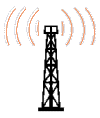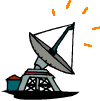Jan's Computer Basics:
Computer to Computer: Transmission Media
With such complex communications channels, we need to be aware of the capabilities and limitations of the various media in use.
Transmission media just means the physical materials that are used to transmit data between computers.
Cable
For communications between computers that are linked by cable, there are three choices.
Twisted wire
|
(phone line)
| Advantage: |
Easy to string
Cheap |
| Disadvantage: |
Subject to interference = static and garble |
|
 |
Coaxial cable
|
(round insulated wire)
| Advantage: |
Not susceptible to interference
Transmits faster |
| Disadvantage: |
Heavy & bulky
Needs booster over distance |
|
 |
Fiber optic line
|
(glass fibers)
| Advantage: |
Smaller
Lighter
Faster
No interference |
| Disadvantage: |
Expensive
Harder to install and modify |
|
 |
Broadcast
For longer distances or when cables are
not practical, other transmission media come into play. We're getting really high tech here!
It may seem odd to call microwaves, radio waves, or light a "physical" medium. All are electromagnetic in nature. Sometimes they are treated by scientists like streams of teeny, tiny particles and other times like waves on the beach. In their "particle" life, they do behave like a bunch of physical particles. So it's not quite as odd as it first appears. (But all those electromagnetic things are plenty odd!)
Wireless
|
(infrared, light, radio) Wi-Fi uses radio waves.
| Advantage: |
|
| Disadvantage: |
- Slower data transfer than hard-wired methods
- Subject to interference
- Infrared only for short distances - in the same room.
- Infrared and visible light easily blocked by objects
- Wi-Fi normally requires a passcode.
- Finding a public Wi-Fi hot spot can be difficult.
|
|

Wi-Fi signal logo
|
Microwave
|
Uses cell towers. 3G and 4G wireless connections are now common for smart phones but also laptops and tablets.
| Advantage: |
- Works where your cell phone works and maybe on the same data plan
|
| Disadvantage: |
- Can be blocked by buildings, metal, etc.
- Must be in an area with signal.
|
|
 |
Satellite
|
| Advantage: |
- Satellite is always in same spot in the sky.
- Excellent signal strength
|
| Disadvantage: |
- Expensive uplink and downlink facilities
- Not easily portable yet
- Must be able to 'see' the satellite (line-of-sight)
|
|
 |


